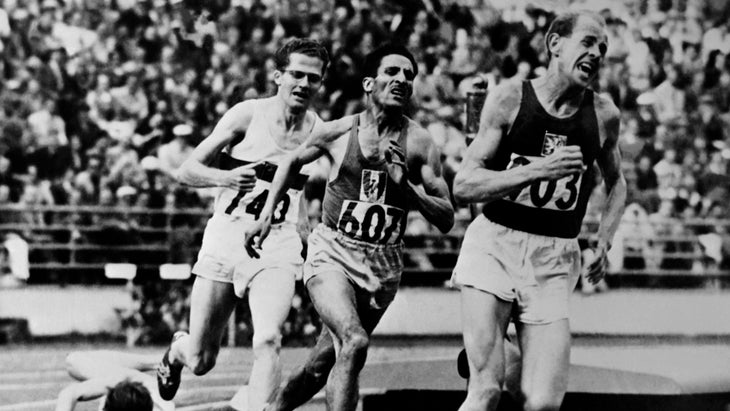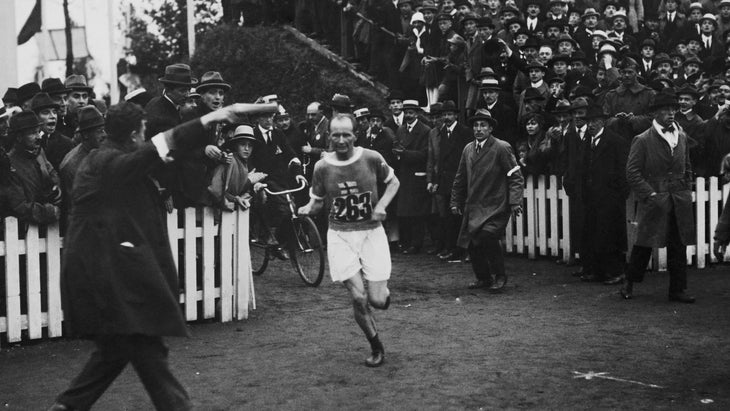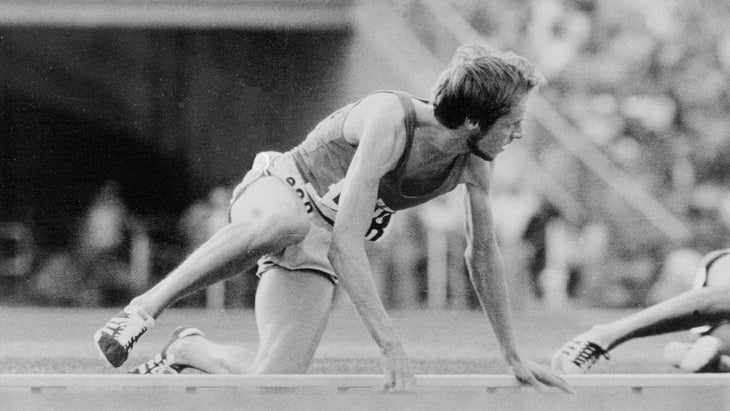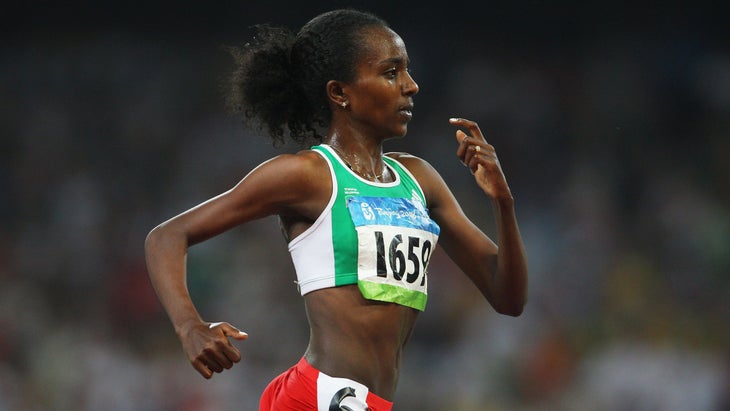As Sifan Hassan Attempts Olympic Triple, a Look at Historic Multi-Medalists
5 min readThis article was first published by PodiumRunner.com. To get more of their premium content along with your Outside subscription, join Outside+.
Can Sifan Hassan win three golds in Tokyo? She’s officially confirmed her bid for the Olympic distance triple on the track and has won the first of the three events, the 5,000m — on the same day when she fell in the heat of the 1500m, got back up, and chased down the pack to win.
Sifan Hassan has decided to include the 1,500m in her campaign for Olympic glory. The 2019 World Champion, who doubled and won both the 1,500m and 10,000m will showcase her range again at the Tokyo Olympic Games,” said a press statement from her agency, Global Sports Communications, released Sunday evening. “She looks forward to tackling the enormous feat and wants to challenge herself in her favorite distances.”
No runner has ever won the 5,000m, 1,500m, and 10,000m at the same Olympics. That treble would let Hassan step on to a very special podium, with Paavo Nurmi, Emil Zátopek, and other multi-victory giants whose golden shadows still shimmer over the Tokyo track.
Olympic Trebles
Paavo Nurmi was ready for the same treble as Hassan in 1924, and more. In Paris, he won the 1500m, and 5,000m, plus the 10K cross-country, and team gold in that race. With four distance-running golds at one Games he stands unmatched. But Finland’s team management left him out of the 10,000m, where he would have been defending champion. Nurmi was so infuriated that while the Olympic race was in progress, he went to the training track and ran a solo 10,000m, faster than his team-mate Ville Ritola’s gold medal time in the stadium. That story may be Olympic urban legend, but with Nurmi, driven as he was by Finnish sisu, it’s totally credible. Nurmi also won golds at 10,000m and cross-country in 1920, and 10,000m in 1928.

Emil Zátopek also stands unmatched, for his three golds at 5,000m, 10,000m and the marathon in 1952. He alone has won the marathon and another gold at the same Games — two other golds in his case, an unmatched triple. On the track, the indefatigable Czech was called the “Colossus,” set 17 world records up to 30K, and in the three-year build up to the Games he compiled a streak of 69 wins over 5,000m and 10,000m. But the Olympic marathon was his first try at the distance. Some debut! To win it, Zátopek had to break the heart of the world record holder, Jim Peters (GBR) by innocently asking a novice’s questions about the pace, as they raced (with Swede Gustaf Jansson) a minute ahead of the rest of the field. Zátopek won by 2 minutes 32 seconds (2:23:03.2).

Hannes Kolehmainen (Finland) in 1912 also won three – 5,000m, 10,000m, and cross-country. Finland were edged by the Swedes for the cross-country team title, depriving Kolehmainen of a 4th gold medal. To seal his place among the multi-victory legends, he won the marathon eight years later, in the post-World War I Games in Antwerp in 1920. Trivia question: which American won the 1920 Olympic marathon? Answer: Kolehmainen at that date had become a U.S. citizen fully resident in New York City, but Olympic rules then did not permit switching national affiliation, so having won for Finland in 1912, he more reluctantly won for Finland again in 1920.
Olympic Doubles

Lasse Viren (Finland) took his special place with a double double, winning the 5,000m/10,000m twice, 1972 and 1976. To do that, he had to overcome two generations of the fiercest competition, outsmarting and outracing the likes of Miruts Yifter, Mohammed Gammoudi, Steve Prefontaine, Carlos Lopes, Brendan Foster, and Dick Quax. The ultimate Viren race was the first of the four, the Munich 10,000. With Dave Bedford setting world-record pace, Viren was tripped, crashed, fell to the track, got back on his feet, chased, closed, took the lead at 6k, broke most of the field, and won by one second in a world record-setting 27:38.35. One of sport’s great comeback stories, but for “Mr. Cool” Viren, only the first of four.
Mo Farah (GBR) emulated Viren’s double double, winning 5,000m and 10,000m in 2012 and 2016, showing amazing ability to control every race to give scope to his unbeatable last mile acceleration.

Hicham El Guerrouj (Morocco) in 2004 is the only runner other than Nurmi to bridge the middle-distance/long-distance gap by winning the doubly challenging 1500m/5,000m double. Like Viren, he really had to work for it, having to beat Bernard Lagat (then Kenya) in the shorter race, and double-hungry Kenenisa Bekele over 5,000m, with a youthful Kenyan called Eliud Kipchoge in third. Guerrouj was defined by his kick, and how precisely he used it. The total margin of those two victories was 0.32sec (0.12 and 0.20). Blink once and win two Olympic gold medals!

Tirunesh Dibaba (Ethiopia) is the only woman to double at long-distances, taking the 5,000m and 10,000m at Beijing in 2008. She followed up by repeating at 10,000m in 2012, plus third in the 5,000m, and a 10,000m bronze in 2016. She was also one of history’s most immaculate cross-country runners. What a treble she could have given us, if cross-country had been back in its deserved place on the Olympic schedule. Women of course have had very limited opportunity to join this special club, with the full range of distance events not available until 1996 (and the steeplechase not till 2008). The only other women’s double so far was by Kelly Holmes (GBR), 800m/1500m in 2004.
Distance Double Honor Roll
Surprisingly, doubles have been achieved (including 800/1500) by 16 runners at 17 Olympic Games.
Here is the full honors list, in chronological order:
1896 Teddy Flack (Australia) 800/1500
1904 James Lightbody (USA) 800/1500
1908 Mel Sheppard (USA) 800/1500
1912 Hannes Kolehmainen (Finland) 5,000/10,000/cross-country
1920 Albert Hill (GBR) 800/1500
1924 Paavo Nurmi (Finland) 10,000/cross-country/XC team
1928 Paavo Nurmi 1500/5,000/cross-country/XC team
1952 Emil Zátopek (Czech) 5,000/10,000/marathon
1956 Vladimir Kuts (USSR) 5,000/10,000
1964 Peter Snell (New Zealand) 800/1500
1972 Lasse Viren (Finland) 5,000/10,000
1976 Lasse Viren 5,000/10,000
1980 Miruts Yifter (Ethiopia) 5,000/10,000
2004 Hicham El Guerrouj (Morocco) 1500/5,000
2004 Kelly Holmes (GBR) W800/1500
2008 Kenenisa Bekele (Ethiopia) 5,000/10,000
2008 Tirunesh Dibaba (Ethiopia) W5,000/10,000
2012 Mo Farah (GBR) 5,000/10,000
2016 Mo Farah (GBR) 5,000/10,000
Roger Robinson tells running’s best stories in his acclaimed When Running Made History and forthcoming (2022) Running’s Greatest Stories.




